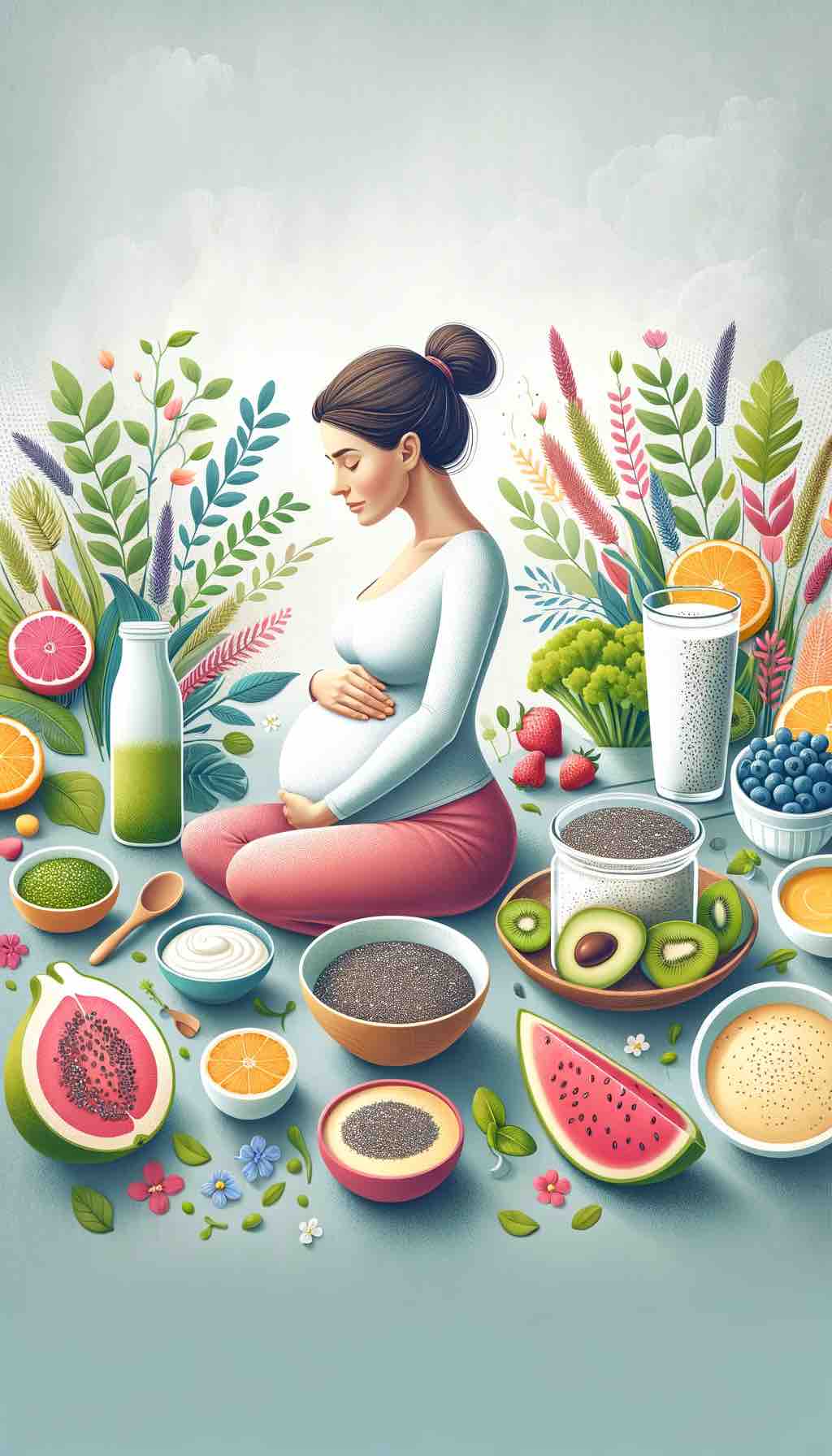
Introduction:
Welcome to the wonderful world of pregnancy nutrition! Today, we’re zeroing in on chia seeds – tiny seeds with enormous benefits. Often hailed as a superfood, chia seeds have gained popularity, but the big question for expecting mothers is: are they safe and beneficial during pregnancy? Let’s dive into the science-backed benefits, practical ways to incorporate them into your diet, and address some common concerns.
Unpacking the Nutritional Punch of Chia Seeds:
Chia seeds are a treasure trove of nutrients. They are packed with omega-3 fatty acids, particularly ALA (alpha-linolenic acid), which plays a role in reducing inflammation. While ALA isn’t the same as DHA – crucial for brain development – it’s still beneficial in its own right. Moreover, chia seeds are rich in dietary fiber, protein, calcium, iron, and a host of antioxidants.
Why Chia Seeds Shine in Pregnancy:
- Fetal Brain Development: The omega-3s in chia seeds contribute to the neural and visual development of your baby.
- Digestive Health: The fiber content helps combat common pregnancy-related issues like constipation and maintains stable blood sugar levels, reducing the risk of gestational diabetes.
- Bone Strength: With a calcium content higher than most dairy products, chia seeds support the skeletal development of your baby.
- Iron Source: They are a non-meat source of iron, critical for preventing anemia in pregnancy and promoting the baby’s cognitive development.
Incorporating Chia Seeds into Your Pregnancy Diet:
- Start your day with a chia seed pudding or sprinkle them over your morning yogurt.
- Add a tablespoon to your smoothie for a fiber boost.
- Mix them into oatmeal or cereal for a crunchy texture.
Navigating the Concerns and Side Effects:
While chia seeds are largely beneficial, it’s essential to be aware of potential side effects. Consuming them in excess can lead to gastrointestinal discomfort. They also have blood-thinning properties, so if you’re on specific medications, a consultation with your healthcare provider is advisable.
How Much is Too Much?
The golden rule of moderation applies here. About 1 ounce per day is recommended, but start with a smaller amount and see how your body responds. Remember to increase your water intake, as chia seeds absorb water and expand.
Chia Seeds vs. Other Seeds:
Chia seeds and flax seeds often go head-to-head in the nutritional showdown. While both are beneficial, chia seeds have the upper hand in omega-3 and fiber content.
Conclusion:
Chia seeds can be a fantastic addition to your pregnancy diet. They offer a range of nutrients essential for your and your baby’s health. However, like any food during pregnancy, they should be consumed in moderation and after consulting with your healthcare provider.
Final Thought:
Remember, every pregnancy is unique. While chia seeds are generally safe and beneficial, your individual nutritional needs and health considerations should guide your dietary choices.
Happy and healthy eating!
FAQs
- Q: Is it safe to consume chia seeds during pregnancy? A: Yes, chia seeds are generally safe and beneficial during pregnancy, offering essential nutrients like omega-3s, fiber, and iron. However, it’s always best to consult with your healthcare provider first.
- Q: How many chia seeds should I eat per day while pregnant? A: About 1 ounce (or 2 tablespoons) per day is recommended. Start with a smaller amount and increase gradually to avoid gastrointestinal issues.
- Q: Can chia seeds help with pregnancy-related constipation? A: Yes, the high fiber content in chia seeds can help alleviate constipation, a common issue during pregnancy.
- Q: Are chia seeds beneficial for my baby’s development? A: Absolutely! Chia seeds are rich in omega-3 fatty acids which are important for your baby’s brain development.
- Q: Can I consume chia seeds in any form? A: Chia seeds can be soaked in water, added to smoothies, yogurts, or sprinkled on salads. They’re versatile and can be incorporated into various dishes.
- Q: Do chia seeds pose any risk of allergies? A: Chia seeds are not commonly allergenic, but if you have a history of food allergies, it’s best to consult your doctor before adding them to your diet.
- Q: Will eating chia seeds affect my blood sugar levels? A: Chia seeds can actually help stabilize blood sugar levels due to their high fiber content, which is beneficial in preventing gestational diabetes.
- Q: Can chia seeds help with maintaining energy levels during pregnancy? A: Yes, the protein and healthy fats in chia seeds can provide sustained energy, which is helpful during pregnancy.
- Q: Are there any side effects of eating chia seeds during pregnancy? A: Consuming chia seeds in excess can lead to gastrointestinal discomfort like bloating or gas. They also absorb a lot of water, so ensure to stay well hydrated.
- Q: Can I replace my prenatal omega-3 supplements with chia seeds? A: While chia seeds are a good source of ALA, a type of omega-3, they don’t provide DHA, which is also crucial during pregnancy. It’s best to use them as a supplement to your diet, not a replacement for prenatal omega-3 supplements.









